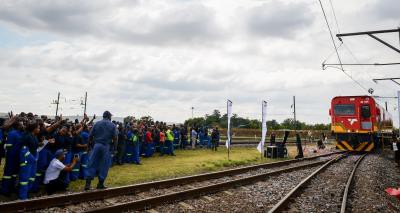
New Delhi, Almost six years after Alstom signed a contract ro provide 800 fully electric locomotives to India, the company on Friday said that it has delivered the 100th electric locomotive of 12,000 HP to Indian Railways, built in one of India's largest integrated greenfield manufacturing facilities and the country's most powerful made-in-India electric locomotive.
Speaking on this milestone, Alain SPOHR, Managing Director, Alstom India said, "I am pleased to mention that despite challenges posed by Covid-19, we have been able to successfully manufacture and deliver 100 e-Locos to the Indian Railways in less than a year."
He said due to the intricacy of the project, it is really an honour to work on a first-of-its-kind 'Make in India' project that resulted in a technology breakthrough for the nation.
"Our successful collaboration with Indian Railways is paving the way for bringing advanced innovation and technology to the country. Alstom is committed to delivering safe, reliable, and efficient solutions for Indian Railways revolutionary journey towards becoming the world's first 100 per cent green railways," the Alstom India MD said.
Touted as the largest Foreign Direct Investment (FDI) project of the Railways, the Ministry of Railways and Alstom came together in 2015, signing an agreement worth 3.5 billion euros to manufacture 800 electric locomotives for freight services and its associated maintenance.
According to Railway Ministry officials, these locomotives are state-of-the-art IGBT-based, 3 phase drive, 9,000 KW (12,000 horsepower) electric locomotives. The locomotive is capable of maximum tractive effort of 706 kN, which is capable of starting and running a 6000 T train in the gradient of 1 in 150. The locomotive with twin Bo-Bo design having 22.5 T (tonnes) axle load is upgradable to 25 tonnes with design speed of 120 kmph.
Alstom in a statement said, in the financial year 2020-2021, Indian Railways recorded a freight loading of 1,232 million tonnes, which was 2 per cent higher than the previous fiscal.
Introduction of faster trains has helped increase the average speed of transportation by 83 per cent leading to a shorter turnaround time and has supported the movement of essential goods during Covid-19 times.
"With the first Prima T8TM WAG-12B inducted for commercial service in May 2020, these locomotives are transforming the heavy freight transportation landscape of India. Deployed for operations on major freight routes, including Dedicated Freight Corridors, the Prima T8TM WAG-12B e-locos have already clocked close to 5 million kilometres hauling a wide range of commodities," it said.
These locomotives also made the inaugural run on the first fully operational sections of the Dedicated Freight Corridors, in December 2020. Some of the key commodities moved by Alstom e-Locos include coal, cement, food grains, fertilisers, petrochemical products, minerals, and posts or parcels, across 17 States and two Union Territories.
The Prima T8TM WAG-12B e-Locos are built at one of India's largest integrated greenfield manufacturing facilities at Bihar's Madhepura.
The industrial site is spread across 250 acres and has an installed production capacity of 120 locomotives per annum.
The company said that Alstom has progressively achieved over 85 per cent indigenisation.
With these powerful e-Locos being manufactured within the country, India has become the 6th in the world to join the club of countries producing high horsepower locomotives indigenously.
The project also includes setting up of two ultramodern maintenance depots in Saharanpur in Uttar Pradesh and Nagpur in Maharashtra.
Alstom said that these depots are equipped with the latest technologies and features to anticipate breakdowns thereby enabling proactive maintenance of India's most advanced freight locomotives at significantly lower costs.
The depot in Saharanpur is currently operational and houses a 'Training Centre' equipped with a loco simulator and smart classrooms for skill development of railway employees and loco pilots. Till date, more than 500 loco pilots from Indian Railways have been trained and going forward, an additional 500 will be trained annually.
The Nagpur depot will be functional next year, it added.


.jpeg)

